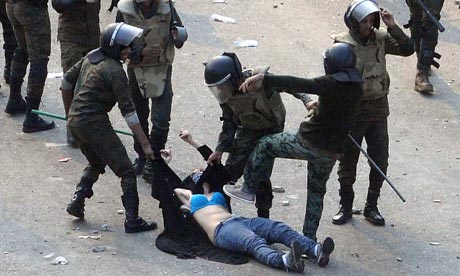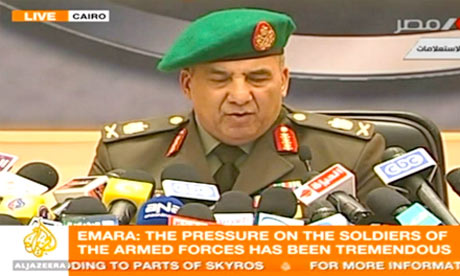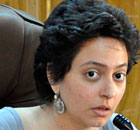• Syria signs deal with Arab League to let monitors in
• Fourth day of clashes in Tahrir Square
• More than 700 injured since Friday in Cairo
• Fourth day of clashes in Tahrir Square
• More than 700 injured since Friday in Cairo
This page will update automatically every minute: On | Off

Egyptian army soldiers beat a female protester during clashes at Tahrir Square, pulling up her head scarf and dragging her through the street. Photograph: Reuters
Brian Whitaker, the Guardian's former Middle East editor, sends his analysis of Syria's signing of the Arab League deal. He says that the deal should take much of the heat out of this inter-Arab diplomatic confrontation – but whether it will achieve anything on the ground is another matter.
The Arab League's observers will spend only a month in Syria and we can expect a cat-and-mouse game between them and the Syrian security apparatus.Syria's prolonged quibbling over signing the agreement is reminiscent of what happened in Yemen between the Gulf Cooperation Council and President Ali Abdullah Saleh, who backed off from signing the deal at the last minute on several occasions.Bashar al-Assad hasn't been quite as obstructive as Saleh was but his stalling tactics have bought him more time to kill more protesters - as happened in Yemen too.It appears that the Arab League document hasn't actually been signed by Assad. He could easily have done so in Damascus. Sending his deputy foreign minister (not even his foreign minister) to Cairo to sign it probably reflects his real view of the agreement: as a nuisance to be got out of the way rather than something to be observed in both letter and spirit.
In the comments, zerozero has posted the full video of the unnamed woman being beaten by Egyptian soldiers in Cairo. It is quite horrendous, but shows exactly how violent the attack on her is. The video also shows many other violent attacks on protesters by soldiers.
The woman photographed being beaten is an activist who does not want her name revealed because of her shame at the way she was treated, according to those who were with her at the time.
Hassan Mahmoud, a journalist with the newspaper Al Badeel who was there, said the woman stumbled as she tried to flee from the military police, who managed to grab her and beat her. "It was clear to me that they wanted to take her away from us but then a few brave protesters came in and started hurling stones and that was the one thing that saved her from their hands."
He said she was treated for hand and leg wounds, then taken to a centre for rehabilitation of violence victims called El Nadeem Centre, before being taken home.
Mahmoud said she told him: "It doesn't matter if I talk [to the media] or not, their stripping me is enough to reveal them [the army] and tell enough to those who still believe them."
By signing the Arab League deal, Syria is likely to avoid having the UN take action, the Associated Press reports. Instead fellow Arabs will take the lead in trying to resolve the nine-month crisis. Many opponents of the regime believe Bashar al-Assad, the country's president, is merely trying to gain time by signing.
More on Syria signing the Arab League deal. Walid al Muallem, the Syrian foreign minister, said the agreement was signed "a while ago" in Cairo after the Arab League accepted amendments to the deal demanded by Syria.
Syria has signed the Arab League initiative, al-Jazeera reports. Syrian foreign minister Walid al Muallem has just been announcing the signing in Damascus.
Arab monitors will now be allowed into Syria - but for one month, not two as was originally planned.
The initiative calls for the following:
• Withdrawing the army from towns.
• Freeing thousands of political prisoners.
• Starting up a dialogue with the opposition.
• Letting Arab monitors into the country.
 Egypt's military rulers hold a press conference today. Photograph: Al-Jazeera Photograph: Al-Jazeera
Egypt's military rulers hold a press conference today. Photograph: Al-Jazeera Photograph: Al-Jazeera The Supreme Council of Armed Forces is giving a press conference on the latest round of violence in Egypt.
The message from General Adel Emara is familiar.
He says the army did not attack or use violence against protesters but it was thugs who caused the clashes.
He blames the media for working against the national interests and said the integrity of Scaf, which answers only to God, could not be questioned.
Emara also seems to suggest that the disturbances have been the work of an unnamed outside entity.
A number of people are live-tweeting the ongoing press conference, including Sultan al-Qassemi, Omnia al-Desoukie and Daily News Egypt.
The US-based Syrian dissident Ammar Abdulhamid, a vocal critic of the Syrian National Council, the Syrian opposition coalition, hasused his latest blogpost to urge the SNC not to focus on gaining international recognition over gaining the acceptance of the Syrian people as a legitimate voice.
He links to a video in which he says protesters in the Deir Baalbah neighbourhood of Homs gave the SNC an ultimatum to better reflect the demands of the revolution or else they will start carrying banners saying "the SNC does not represent me".
Abudlhamid writes:
Getting international recognition at this stage is not as important as consolidating our base of support and legitimacy on the ground. For this, our discourse and our actions need to be carefully modulated so as to garner popular support and respect. We all also need to find ways to support protest communities and the local resistance, especially the armed resistance. Some in the international community may not like it, but armed resistance has become a fact on the ground, even if it is still in its infancy. No political group aspiring to lead the revolution and the transitional period beyond can afford to let armed resistance take place outside its purview and its controls.A political group that has no real control over armed resistance cannot hold the country together in that most critical period of transition that lies ahead. As such, we are not just talking about creating the façade of control, but the reality of it. SNC leaders have excelled in creating façades but not realities. That's good for them, but it is not good for the country.Our priority at this stage should be to get internal recognition, not international one. When that is truly "in the bag", international recognition will follow. We should also remember that the real challenge is not about achieving some sort of haphazard unity, but about projecting the needed leadership, vision and representation, it's about the quality of work, and of who we are.
Egypt's health ministry says at least three more protesters have been killed in clashes with army soldiers in central Cairo, bringing the four-day death toll to at least 14, AP reports.
A doctor at a field hospital in Tahrir Square puts the toll from Monday's violence at six. Ahmed Saad says all of them were killed by gunshots. The discrepancy could not be immediately reconciled, says AP.
 Photograph: Reuters
Photograph: Reuters The Syrian blogger Razan Ghazzawi (pictured left) has been released on bail two weeks after being arrested en route to a conference on press freedoms in Jordan, AFP reports.
It quotes the Syrian Centre for Media and Free Expression as saying:
"Razan Ghazzawi was released from detention at 10.30pm (8.30pm GMT) Sunday on bail of 15,000 Syrian pounds (around $300)."
US born Ghazzawi is one of the few Syrian bloggers to post under her real name. The 31-year-old had been documenting human rights abuses in recent months, and was arrested on 4 December at the border while on her way to Jordan for a conference on press freedoms.
On 12 December, the Syrian authorities charged her with trying to incite sectarian strife, spreading false information and weakening national sentiment.
Syria's deputy foreign minister, Faisal Mekdad, has arrived in Cairo, an Egyptian airport official has told the Associated Press. He is expected to sign an agreement allowing Arab observers into the country.
The pro-government Syrian newspaper al-Watan reported that Mekdad will sign the agreement in Cairo.
The Arab League has given Syria until Wednesday to sign the deal, the latest in a series of deadlines it has set.
Welcome to Middle East Live. Once more the focus is on Syria, with reports once more that Bashar al-Assad is ready to sign the Arab League peace plan, and Egypt, where there has been more bloodshed in Tahrir Square.
Egypt
• Clashes between Egypt's ruling military and protesters insisting that they cede power have continued in Cairo's Tahrir Square for a fourth day. Police and soldiers using guns and batons drove stone-throwing protesters out of the square during the night, as could be seen on on video uploaded to YouTube:
But by dawn protesters had trickled back into the square, according to Reuters.
The health ministry said on Sunday that 10 people had been killed in the violence since Friday. Some activists have put the number of people killed at 13. There have also been reports that five people were killed overnight. The health ministry said there were 200 injuries overnight, bringing the total to over 700, with more than 400 taken to hospital. In Sunday's clashes, protesters and troops battled on two main streets off Tahrir Square, trading volleys of stones and firebombs around barriers that the military set up to block the two central avenues. The Supreme Council of the Armed Forces has blamed the violence on hooligans. It said two soldiers were in hospital after being captured by protesters on Sunday. Protesters said three soldiers were captured but have since been released.
Mohammed Mohie Hussein, who was among some 200 people being held in a Cairo court after being arrested at the clashes died on Sunday within an hour of his interrogation in the presence of several defence lawyers, according to human rights lawyer Ahmed Ragheb.
The US secretary of state, Hillary Clinton, said she was "deeply concerned" about the violence and urged the security forces "to respect and protect the universal rights of all Egyptians. She also called on protesters "to refrain from acts of violence".
Ban Ki-moon's office said the UN secretary general "is highly alarmed by the excessive use of force employed by the security forces against protesters, and calls for the transitional authorities to act with restraint and uphold human rights, including the right to peaceful protest".
• The shocking image of the unknown woman being dragged and beaten by soldiers in Tahrir Square during the clashes is a potent symbol that the revolution is far from over, the Egyptian novelist Ahdaf Soueif writes for Comment is Free:
They [the military rulers] killed 10 people, injured more than 200, and they dragged the unconscious young woman in the blue jeans – with her upper half stripped – through the streets.The message is: everything you rose up against is here, is worse. Don't put your hopes in the revolution or parliament. We are the regime and we're back ...The young woman in the blue jeans has chosen so far to retain her privacy. But her image has already become icon. As the tortured face of Khaled Said broke any credibility the ministry of the interior might have had, so the young woman in the blue jeans has destroyed the military's reputation.
• There have been more heavy gun battles between Syrian security forces and army defectors. The British-based Syrian Observatory for Human Rights said an army officer was among the six soldiers killed on Sunday in the town of Qusair in Homs province, near the border with Lebanon. Heavy gun battles were also reported in several villages in the restive Jabal al-Zawiya region in the northern Idlib province near the Turkish border, where many defectors are believed to be operating. Another activist group, the Local Co-ordination Committees, said there were clashes in Tadmur in Homs, after an entire platoon defected. The LCCs put the death toll on Sunday at 20: 11 in Homs, eight in Idlib, and one in Dara'a.

No comments:
Post a Comment